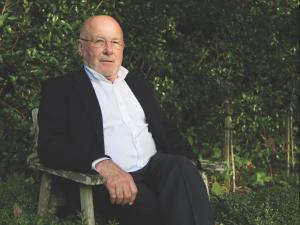Respiratory physician Lutz Beckert considers chronic obstructive pulmonary disease management, including the prevention of COPD, the importance of smoking cessation and pulmonary rehabilitation, and the lifesaving potential of addressing treatable traits. He also discusses the logic of inhaler therapy, moving from single therapy to dual and triple therapy when indicated, as well as other aspects of management
The wasted years spent on pause
The wasted years spent on pause

Acting editor Patrice Dougan watches as electioneering mimics the primary care reform report-go-round
A complete overhaul of the health system is a year in, with no changes announced for primary care
Apparently nothing gets voters to the polls better than the lure of four-lane motorways, new bridges, and tunnels under Auckland’s Waitematā Harbour.
The spectre of a second harbour crossing seems to rise from the grave of the quietly buried artist’s impression of its predecessor every couple of years. It’s a promise that gets bandied about by politicians of all stripes, and has been talked about for as long as I have lived in New Zealand – 11 years and counting.
The first one I remember was John Key’s 2013 proposal – dubbed “essential and long overdue” by then North Shore National MP Maggie Barry.
As I drove over the Harbour Bridge on my way to work, listening to news of the latest proposal – two three-lane vehicle tunnels and a third tunnel for light rail, which may or may not come to fruition – it struck me primary care is in the same hamster wheel.
The problem has repeatedly been identified, investment is essential and long overdue, reports have been commissioned, ideas proposed, consultations had, but then it quietly runs out of steam, having not moved forward.
In the past eight years, primary care has been scrutinised in detail. Initially it was the review led by specialist GP Peter Moodie (2015); then the Waitangi Tribunal report on primary care Treaty of Waitangi breaches (2019); followed of course by the Health and Disability System Review or Simpson report (2020); and then two Sapere reports – on correcting the underspend on Māori providers (2021) and on capitation funding (2022).
Yet a complete overhaul of the health system is a year in, with no changes announced for primary care.
However, in recent weeks numerous senior government figures have been dropping little breadcrumbs (to borrow an analogy from the boss) about a “roadmap” for primary care. Both health minister Ayesha Verrall and Te Whatu Ora board chair Dame Karen Poutasi name-dropped this roadmap at the recent GP23 conference in Auckland. Both stressed the importance of primary care and general practice feeding back to officials about what is needed.
The Ministry of Health’s chief medical officer Joe Bourne, in an opinion piece for this issue also hints at a process happening behind the scenes, and says there will be “multiple opportunities to engage with efforts to make positive changes to the health system”.
Dr Bourne goes further, in saying there will be a national strategic design focused on four areas, which appear to cover birth to old age, as well as mental health.
However, an attempt to get further information from the ministry on this roadmap has not “borne” fruit and no announcement made as this edition went to press.
I don’t doubt the genuine desire to consult with primary care over what changes need to be made to improve the sector – and that’s a good thing. In my brief time reporting on it, I know there’s no desire for a top-down approach.
Dr Verrall told the conference she had “heard very clearly” from general practice that it wants to be involved in any changes proposed by the Government, and that she was “absolutely committed” to supporting the sector. I think she meant it.
The Government and its health agencies are clearly working on a plan for primary and community care, which will require some level of buy-in from the sector if it’s to be meaningful.
But, with increasing numbers of practices closing their books, long wait times for appointments to see a GP, and ongoing workforce shortages all limiting people’s ability to access primary healthcare, surely these things will be at the front of voters’ minds in the run-up to 14 October, more than roads and tunnels.
Let’s hope this latest attempt at consulting on primary care – whenever it is eventually announced – won’t end up gathering dust in the pile with its predecessors.

![Breadcrumbs [Coprid on iStock]](/sites/default/files/styles/cropped_image_4_3/public/2023-08/Breadcrumbs_CR_Coprid_on_iStock-994631510.jpg?itok=u9UNqHTm)







![Barbara Fountain, editor of New Zealand Doctor Rata Aotearoa, and Paul Hutchison, GP and senior medical clinician at Tāmaki Health [Image: Simon Maude]](/sites/default/files/styles/thumbnail_cropped_100/public/2025-03/Barbara%20Fountain%2C%20editor%20of%20New%20Zealand%20Doctor%20Rata%20Aotearoa%2C%20and%20Paul%20Hutchison%2C%20GP%20and%20senior%20medical%20clinician%20at%20T%C4%81maki%20Health%20CR%20Simon%20Maude.jpg?itok=-HbQ1EYA)
![Lori Peters, NP and advanced health improvement practitioner at Mahitahi Hauora, and Jasper Nacilla, NP at The Terrace Medical Centre in Wellington [Image: Simon Maude]](/sites/default/files/styles/thumbnail_cropped_100/public/2025-03/2.%20Lori%20Peters%2C%20NP%20and%20advanced%20HIP%20at%20Mahitahi%20Hauora%2C%20and%20Jasper%20Nacilla%2C%20NP%20at%20The%20Terrace%20Medical%20Centre%20in%20Wellington%20CR%20Simon%20Maude.jpg?itok=sUfbsSF1)
![Ministry of Social Development health and disability coordinator Liz Williams, regional health advisors Mary Mojel and Larah Takarangi, and health and disability coordinators Rebecca Staunton and Myint Than Htut [Image: Simon Maude]](/sites/default/files/styles/thumbnail_cropped_100/public/2025-03/3.%20Ministry%20of%20Social%20Development%27s%20Liz%20Williams%2C%20Mary%20Mojel%2C%20Larah%20Takarangi%2C%20Rebecca%20Staunton%20and%20Myint%20Than%20Htut%20CR%20Simon%20Maude.jpg?itok=9ceOujzC)
![Locum GP Helen Fisher, with Te Kuiti Medical Centre NP Bridget Woodney [Image: Simon Maude]](/sites/default/files/styles/thumbnail_cropped_100/public/2025-03/4.%20Locum%20GP%20Helen%20Fisher%2C%20with%20Te%20Kuiti%20Medical%20Centre%20NP%20Bridget%20Woodney%20CR%20Simon%20Maude.jpg?itok=TJeODetm)
![Ruby Faulkner, GPEP2, with David Small, GPEP3 from The Doctors Greenmeadows in Napier [Image: Simon Maude]](/sites/default/files/styles/thumbnail_cropped_100/public/2025-03/5.%20Ruby%20Faulkner%2C%20GPEP2%2C%20with%20David%20Small%2C%20GPEP3%20from%20The%20Doctors%20Greenmeadows%20in%20Napier%20CR%20Simon%20Maude.jpg?itok=B0u4wsIs)
![Rochelle Langton and Libby Thomas, marketing advisors at the Medical Protection Society [Image: Simon Maude]](/sites/default/files/styles/thumbnail_cropped_100/public/2025-03/6.%20Rochelle%20Langton%20and%20Libby%20Thomas%2C%20marketing%20advisors%20at%20the%20Medical%20Protection%20Society%20CR%20Simon%20Maude.jpg?itok=r52_Cf74)
![Specialist GP Lucy Gibberd, medical advisor at MPS, and Zara Bolam, urgent-care specialist at The Nest Health Centre in Inglewood [Image: Simon Maude]](/sites/default/files/styles/thumbnail_cropped_100/public/2025-03/7.%20Specialist%20GP%20Lucy%20Gibberd%2C%20medical%20advisor%20at%20MPS%2C%20and%20Zara%20Bolam%2C%20urgent-care%20specialist%20at%20The%20Nest%20Health%20Centre%20in%20Inglewood%20CR%20Simon%20Maude.jpg?itok=z8eVoBU3)
![Olivia Blackmore and Trudee Sharp, NPs at Gore Health Centre, and Gaylene Hastie, NP at Queenstown Medical Centre [Image: Simon Maude]](/sites/default/files/styles/thumbnail_cropped_100/public/2025-03/8.%20Olivia%20Blackmore%20and%20Trudee%20Sharp%2C%20NPs%20at%20Gore%20Health%20Centre%2C%20and%20Gaylene%20Hastie%2C%20NP%20at%20Queenstown%20Medical%20Centre%20CR%20Simon%20Maude.jpg?itok=Z6u9d0XH)
![Mary Toloa, specialist GP at Porirua and Union Community Health Service in Wellington, Mara Coler, clinical pharmacist at Tū Ora Compass Health, and Bhavna Mistry, specialist GP at Porirua and Union Community Health Service [Image: Simon Maude]](/sites/default/files/styles/thumbnail_cropped_100/public/2025-03/9.%20Mary%20Toloa%2C%20Porirua%20and%20Union%20Community%20Health%20Service%20in%20Wellington%2C%20Mara%20Coler%2C%20T%C5%AB%20Ora%20Compass%20Health%2C%20and%20Bhavna%20Mistry%2C%20PUCHS%20CR%20Simon%20Maude.jpg?itok=kpChr0cc)